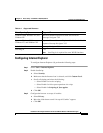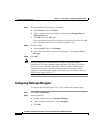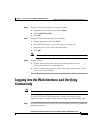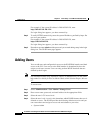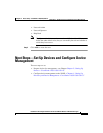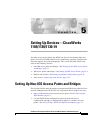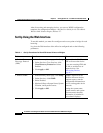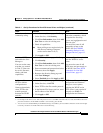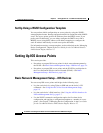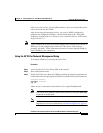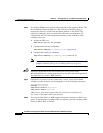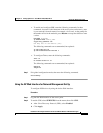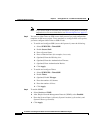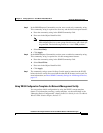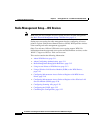
5-3
Installation and Configuration Guide for the CiscoWorks Wireless LAN Solution Engine
78-16345-01
Chapter 5 Setting Up Devices—CiscoWorks 1105/1130/1130-19
Setting Up Non-IOS Access Points and Bridges
3. Set the read/write
community string.
1. In the Summary Status page, click Setup.
2. Under Services, click Security.
3. Click User Information; then click Add
New User or select an existing user.
4. Check all capabilities.
Note Ident privileges are required only for
APs that are running a firmware
version earlier than 12.01(T).
5. Click Apply or OK.
The username is the AP’s
read/write community, which
is required for discovery,
reports, and configuration and
firmware jobs.
2
You must also enter all AP
community strings on the
WLSE. See Enter SNMP
Community Strings for All
Managed Devices, page 6-2.
4. Add an HTTP user
and enable the User
Manager.
3
You can use the same
user that you created
in Task 3, if the user
has write, firmware,
admin, and ident
capabilities.
1. In the Summary Status page, click Setup.
2. Click Security.
3. Click User Information; then click Add
New User or select an existing user.
4. Enter a username and password and select
Firmware; then click Apply.
5. Return to the Security Setup page and
click User Manager.
6. Select Enabled; then click Apply or OK.
Allows configuration uploads
from the WLSE to access
points.
You must also enter all AP
HTTP users and passwords on
the WLSE. See Enter HTTP
Credentials for Non-IOS
Access Points, page 6-3.
5. If you will use
HTTP to initiate
configuration or
firmware downloads,
select TFTP as the
transfer protocol
between the WLSE
and APs.
1. In the Summary Status page, click Setup.
2. Under Services, click FTP.
3. Select TFTP as the file transfer protocol.
4. In the Default File Server text box, enter
the IP address of the WLSE.
5. Click Apply or OK.
TFTP is used for transferring
configuration and firmware
changes to access points.
Selecting the WLSE as the
TFTP server is not required if
you only use SNMP for
configuration and firmware.
1. Do not run CDP on radio ports.
2. For example, if the AP has a user “lab” with password “cisco”, its SNMP credential is lab::10:1:::lab. Its HTTP username and
password are lab/cisco. If the SNMP credential is set incorrectly, jobs will fail.
3. You can use a non-standard HTTP port. If HTTP browsing is not enabled, you must enable it. Enter the console and navigate
to Security > Web Server. Enable Allow Non-Console Browsing.
Table 5-1 Set Up Procedures for Non-IOS Access Points and Bridges (continued)
Tasks Procedure Notes



